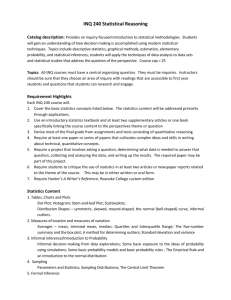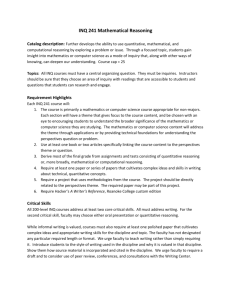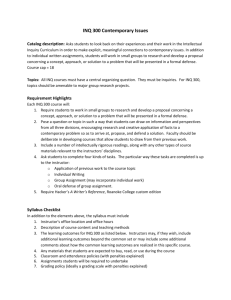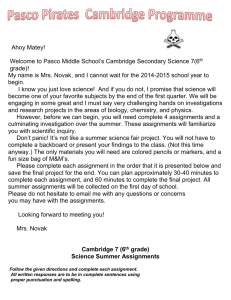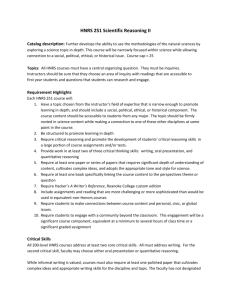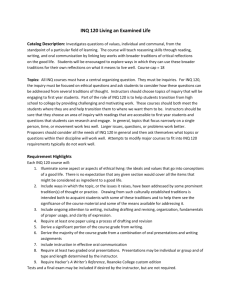INQ 251 Course Approval Worksheet
advertisement
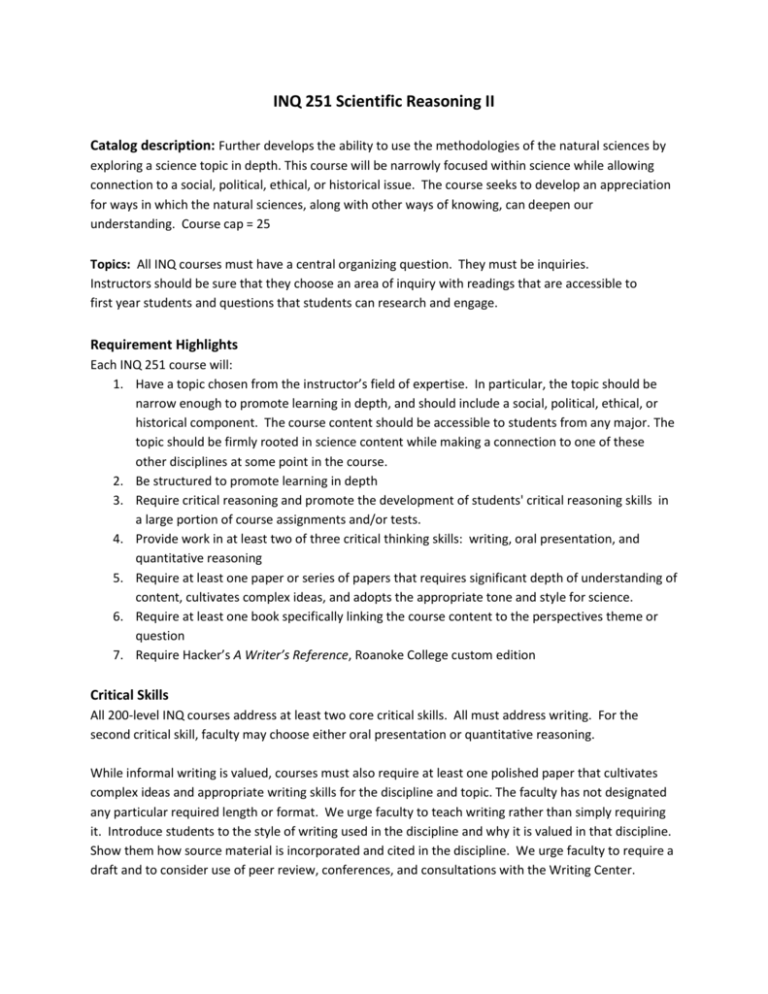
INQ 251 Scientific Reasoning II Catalog description: Further develops the ability to use the methodologies of the natural sciences by exploring a science topic in depth. This course will be narrowly focused within science while allowing connection to a social, political, ethical, or historical issue. The course seeks to develop an appreciation for ways in which the natural sciences, along with other ways of knowing, can deepen our understanding. Course cap = 25 Topics: All INQ courses must have a central organizing question. They must be inquiries. Instructors should be sure that they choose an area of inquiry with readings that are accessible to first year students and questions that students can research and engage. Requirement Highlights Each INQ 251 course will: 1. Have a topic chosen from the instructor’s field of expertise. In particular, the topic should be narrow enough to promote learning in depth, and should include a social, political, ethical, or historical component. The course content should be accessible to students from any major. The topic should be firmly rooted in science content while making a connection to one of these other disciplines at some point in the course. 2. Be structured to promote learning in depth 3. Require critical reasoning and promote the development of students' critical reasoning skills in a large portion of course assignments and/or tests. 4. Provide work in at least two of three critical thinking skills: writing, oral presentation, and quantitative reasoning 5. Require at least one paper or series of papers that requires significant depth of understanding of content, cultivates complex ideas, and adopts the appropriate tone and style for science. 6. Require at least one book specifically linking the course content to the perspectives theme or question 7. Require Hacker’s A Writer’s Reference, Roanoke College custom edition Critical Skills All 200-level INQ courses address at least two core critical skills. All must address writing. For the second critical skill, faculty may choose either oral presentation or quantitative reasoning. While informal writing is valued, courses must also require at least one polished paper that cultivates complex ideas and appropriate writing skills for the discipline and topic. The faculty has not designated any particular required length or format. We urge faculty to teach writing rather than simply requiring it. Introduce students to the style of writing used in the discipline and why it is valued in that discipline. Show them how source material is incorporated and cited in the discipline. We urge faculty to require a draft and to consider use of peer review, conferences, and consultations with the Writing Center. Courses with oral communication as the second critical skill must require a formal oral presentation. Participation in discussion is not sufficient. Oral presentations may be individual or group. Debates and other variants of presentations are welcomed as long as the assignment requires thesis, support, and advance preparation. Faculty members are urged to teach presentation skills rather than simply requiring a presentation. Courses that emphasize quantitative reasoning as the second critical skill must teach QR skills appropriate for the course’s discipline and include one major or a series of smaller assignments that require students to demonstrate at least three of the following five skills: 1. Gather or select data appropriate for its intended purpose including consideration of appropriate controls, variables, and conditions. 2. Represent data to help reveal its utility for a given purpose by creating tables, graphs, figures, calculations or models. 3. Interpret important features or trends in data from tables, graphs, figures or models. 4. Use data in decision-making; explain how quantitative evidence supports conclusions. 5. Handle uncertainty or significance of data by applying or interpreting measures of uncertainty, error, or statistical significance. Syllabus Checklist In addition to the elements above, the syllabus must include 1. Instructor's office location and office hours 2. Description of course content and teaching methods 3. The learning outcomes for INQ 251 as listed below. Instructors may, if they wish, include additional learning outcomes beyond the common set or may include some additional comments about how the common learning outcomes are realized in this specific course. 4. Any materials that students are expected to buy, read, or use during the course 5. Classroom and attendance policies (with penalties explained) 6. Assignments students will be required to undertake 7. Grading policy (ideally a grading scale with penalties explained) 8. Testing policy, including make-up tests 9. RC's academic integrity policy as it applies to the class 10. An outline showing proposed topics, students' assignments, reading list, laboratory work, etc. to be required. 11. The focus of inquiry 12. Be sure that any boilerplate sections (e.g. related to tutoring or Writing Center) are up to date and appropriate for the course. Learning Outcomes for INQ 251—these must go on the syllabus. Instructors may add sectionspecific outcomes if desired. 1. Students will be able to apply scientific methodologies and concepts appropriate for the course’s discipline and topic. 2. Students will be able to write about course topics clearly and effectively. 3. If the course is emphasizing oral communication: Students will be able to communicate effectively about the course topic in an oral format. If the course is emphasizing quantitative reasoning: Students will be able to interpret quantitative information related to the course topic. For Global Perspective courses: 4. Students will be able to articulate how the course’s content explores a Global perspective. Assessment Requirements Each INQ 251 will contribute to the assessment of one of the three critical skills. Instructors choose which. 1. Make sure you have an assignment that fits the rubric. a. Written work may be of any length but needs to be thesis-driven. You need to score Thesis, Reasoning, Evidence, Organization, and Style/Mechanics. b. Oral may be either group or individual but needs to be formal presentation. You need to score on Focus, Organization, Content, Eye Contact, Mannerisms, Verbal Skills, and if required by you, Visual Aids. c. To use the QR rubric, you must have quantitative assignments that would reach the Proficient-level in at least three of the traits listed on the QR rubric. It’s okay if the students get 1s and 2s as long as the assignments allow them to potentially get 3s. It is fine to use one assignment to assess one row in the rubric, and then a different assignment to assess other rows. 2. Score the student work. Note that rubric scores are independent of the grade you give. 3. Record scores for all students in the Excel spreadsheet provided by Gen Ed Director. 4. Submit scores to Gen Ed Director by deadline for final course grades. 5. Send an electronic copy of the assignment. Additional Notes Instructors are encouraged to find ways to build on concepts from INQ 250, in particular, using data to draw conclusions, avoiding bias in the collection and interpretation of data, and the idea of refining scientific theories through new experiments. Courses will make deliberate connections to the perspective (western world, global perspectives, or the natural world) from which the course is taught. A “focus of inquiry” statement of not more than 150 words is required on the Curriculum Committee proposal form. Remember that this is published in the faculty meeting agenda, but is also the description that students will read in the COL when choosing courses. Think about your audience. Be sure that your syllabus and/or descriptive materials in the course proposal form demonstrate that you are including required elements, and in particular clearly connecting with the chosen perspective. Proposal Components The course proposal has three components that the committees can review to determine whether the course is clearly addressing the required components and characteristics: syllabus, focus of inquiry statement, and course proposal form. Committee members can’t read your mind; be sure the required elements are clearly laid out in these places. Focus of Inquiry: Not more than 150 words to describe the essence of your course and its inquiry. Students are the main audience, so write to draw them in. Faculty will also see this description in the faculty meeting agenda. This is a good place to describe the inquiry aspects of the course. Be careful not to include very specific information that could vary in later offerings since changes to this description have to be reported to GEC. Syllabus: In addition to all the regular stuff you put on a syllabus, this is where the committees look for information on the level and volume of readings, types of assignments, instruction on writing, timing of drafts, etc. Help the committee by giving more detail than “Paper 3.” Consider including a paragraph that describes the assignment. (E.g., “Paper 3 will be a research paper on x, in which you will do y and z. Topic approval is due by this date, the annotated bibliography by another date, and the first draft by third date.”) Proposal Form: The questions on the proposal form try to focus on required elements, but also the most common concerns that the committee has had about proposals in past. Please try to answer the questions on the proposal form as directly as possible. Direct, specific answers need not be lengthy. FOCUS OF INQUIRY Each INQ course must have a central organizing question. In the course proposal, this question must be included in the focus of inquiry, a statement of not more than 150 words that explains what focused questions the course addresses and how they are approached in the course structure. The focus of inquiry will be listed on the COL and should also appear on the course syllabus. Remember that students become the audience for this description in the COL. The course needs a focus; it should not be a survey. In typical gen-ed courses of old, the content was the primary driver, while the intellectual questioning wouldn’t be that obvious to the students. An INQ course should make inquiry the primary driver. We should try to design courses where students are intrigued by the topics, stimulated by the questioning aspect and become interested in the content. Their intellectual curiosity is enhanced when they seek answers to the critical questions they’ve been posed or they ask of themselves. The bottom line is, we want to challenge our students to become thinkers by posing critical questions in a more deliberate way and provide them with useful tools to help them seek answers. Are some course features incompatible with inquiry? Not really, but courses that are emphasizing content delivery and where the classroom is instructor-centered rather than student-centered will need to work harder to develop inquiry features in other aspects of the course. All courses deliver content. Inquiry is a way of framing the course and its content. INQ courses should not be surveys. The inquiry nature of an INQ course should also be evident in some aspects of the course’s structure, activities, or assignments. Questioning skills are promoted by deliberately framing the topic as an intellectually rigorous inquiry. Courses should make explicit attempts to explain to students why a particular investigation might be interesting or important. Many inquiry courses share features with scholarly inquiry. They go beyond merely exploring interesting topics to engage students in posing significant questions, seeking information, and proposing solutions. Other courses exhibit inquiry by emphasizing active roles for the students. In particular, a course may ask students to design experiments or choose topics to research. Many instructors choose to use questions to structure sections of a course and assignments. For example, the first third of a course might explore content related to a major question about the course topic. At the end of that section, students write papers where the theses propose answers to the question. While some may consider structuring a course around questions to be a mere mechanical device, it can be an easy way to keep inquiry visible to students. Questions that may seem mechanical to experts can be new and intriguing to students. Instructors should help students be aware of inquiry features in the course through aspects of the syllabus or assignments. METHODOLOGY Each of the 200-level perspectives courses also serves to introduce the methods of a particular discipline. Instructors may do this in many ways, but should insure that students develop an awareness of the disciplinary methods used in the course. The methods used in the perspectives courses aren’t different from those that an instructor would use in any other course; it is rather the intentionality and awareness that is the important distinction. Foregrounding methodologies can change an instructor’s approach to a topic. An excellent way to develop an INQ perspectives course is to start with the topic and disciplinary methodologies. Next create the learning outcomes and key assignments. Once these are in place, the instructor designs the rest of the course to provide students with the experiences needed to eventually satisfy those key assignments and learning outcomes. DETAILS OF COURSE SCHEDULE AND ASSIGNMENTS How much detail of the course schedule and assignments does an instructor need to include in a course proposal? Enough to allow the members of GEC to see that the course is meeting the requirements. The committees look at course schedules to see how much time is being spent on readings, how class time is being used, whether instruction in writing and oral communication is included, whether methodologies are being discussed, if sufficient time for drafting is allowed, and if sufficient time for oral presentations is allowed. Details of assignments can be very helpful to the committee especially in appreciating the use of inquiry or how drafting is being used. While few instructors will have fully detailed assignments sheets, providing some details of the assignment topic and focus helps the committees appreciate what the instructor is doing (with inquiry, methodologies, writing instruction, or other outcomes) and can help avoid a round of clarifying questions. WRITING All INQ courses must require at least one polished paper. Instructors are strongly encouraged to do more than simply assign writing by including techniques that can help students improve their writing and reasoning. Instructors should consider the use of drafts, peer review, workshops, and Writing Center visits. No minimum page totals are specified. SECOND CRITICAL REASONING FOCUS The INQ curriculum focuses on three critical reasoning skills: writing, oral communication, and quantitative reasoning. All INQ courses must address writing. Each of the 200-level INQ courses must include either oral communication or quantitative reasoning as a second critical reasoning skill. ORAL COMMUNICATION Courses that select oral communication as their second critical skill should require at least one graded oral presentation, debate, or similar assignment. Instructors may use either individual or group presentations. Class schedules should show the time allotted for presentations. Remember to multiply the length of presentations by the number of students, and then add some time to change between speakers to find the total time required. Instructors are encouraged to consider using techniques that will help students develop oral skills, such as requiring drafts of PowerPoint, or having class members critique presentations of their classmates. (This also helps keep audience members engaged while listening to their peers.) Be sure to think through the consequences of timing of presentations. For example, do you want to sit through four days of student presentations at the end of the term, or do you want presentations dispersed across the term? QUANTITATIVE REASONING Instructors who select quantitative reasoning as their second critical skill should include sufficient information on topics or assignments to make the quantitative aspects of the course clear. This worksheet is an internal document of GEC. That group uses the worksheet to help committee members focus on key requirements as they review proposals. INQ 251 Course Approval Worksheet Syllabus Requirement Specific Learning Outcomes for the Course Instructor: __________________ Comments Title: ___________________________________________ Gen Ed. Requirement Inquiry clear in description, assignments, . . . Materials Students are Expected to Buy, Read, or Use Attendance Policy (clear, consistent, and fair) Intellectually rigorous readings, assignments, . . . Grading Policy (includes weighting of course components and scale) Perspective (G, W, or N) clear in content and assignments Final Exam (except Inq 110, 120, 300) Suggested: At least one book linking content to theme or perspective At least 1 paper Number of tests, papers, projects and the basic format of each Policies for make-up tests and late work Focused topic but not a major level course Introduces methodologies of the sciences Academic Integrity statement Connection to a social, political, ethical, or historic issue Office location and hours Oral communication or QR? Sufficient in content and assignments? Most of final grade from critical reasoning Other comments or concerns: Learning Outcomes appropriate? Hacker required? Comments

